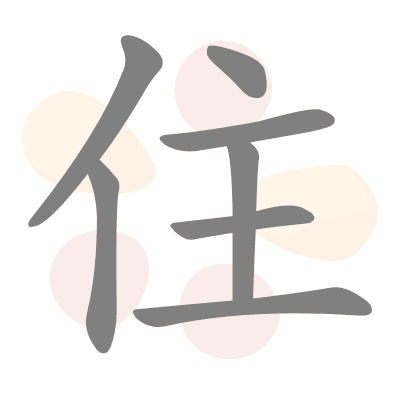住
住
v. live, reside, stay; stop, cease; (after a verb as a complement indicating) a halt or a steadiness; (after a verb as a complement, preceded by "de" or "bu", indicating) being able or unable to reach or meet a standard
| 80% | 120% |
Register to get less ads.
Registration is free and once you are registered you use this word in your private vocabulary lists.
Then you can train your own vocabulary either here or using one of our applications for PC, iOS or Android.
Registration is free and once you are registered you use this word in your private vocabulary lists.
Then you can train your own vocabulary either here or using one of our applications for PC, iOS or Android.
 |
Simplified stroke orders are based on the 'Standard of National Commonly-used Mandarin Chinese Characters (现代汉语通用字笔顺规范)', issued by the China National Language and Character Working Committee (国家语言文字工作委员会) on April 7th 1997. Traditional stroke orders are based on information issued by the Taiwan Ministry of Education.
EXAMPLES
我 我 phr. I want to change my dormitory. I do not want to live here anymore. |
楼 樓 phr. There lives a doctor upstairs. |
住 住 v. to stop, to desist, to stay one's hand, |
抓 抓 v. grab; capture |
握 握 v. grip, hold |
停 停 v. stop, halt, cease |
站 站 v. stand still |
住 住 phr. shut one's mouth, stop talking |
经 經 phr. can stand up to, can resist |
接 接 phr. catch (sth that was moving towards you and it stops, indicating steadiness) |






